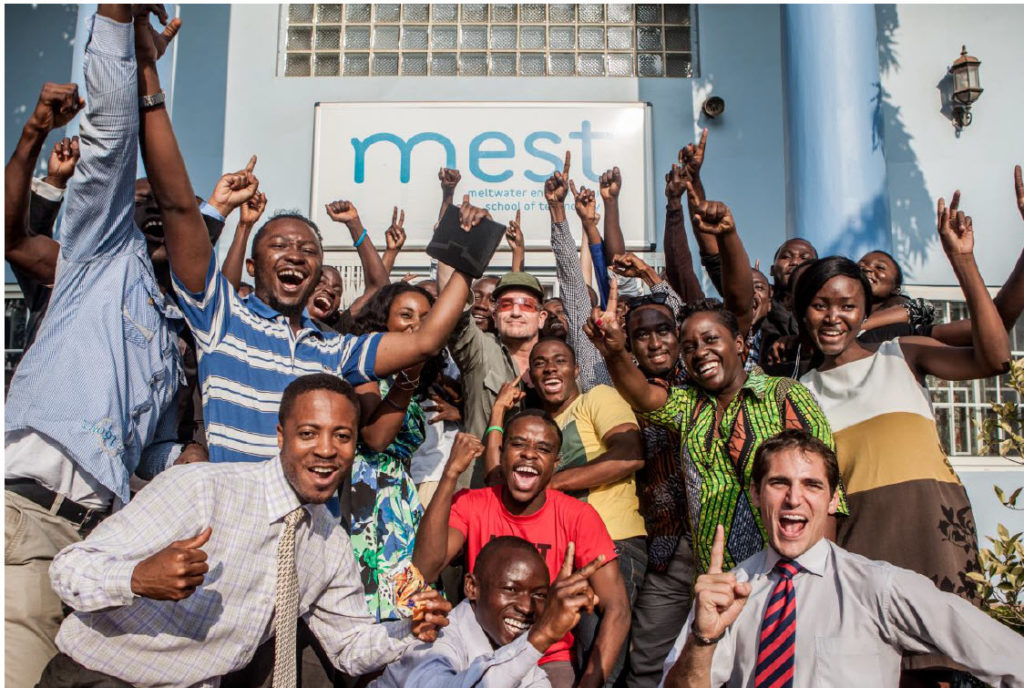Michael Seibel is CEO of Y Combinator Core. He sold Twitch, the startup he co-founded, to Amazon for $1 Billion in 2014. He was also a founder of SocialCam, acquired for $60 million. In a recent blog post he shared his story of being kicked out of Yale for poor grades then bouncing back from that setback!
Michael did a live video AMA (Ask Me Anything) with Capital & Growth late last year. There were two audiences in this AMA: Capital & Growth’s and MEST Ghana’s EITs (Entrepreneurs in Training). We invited MEST because Michael is bullish on the African startup scene—he is an investor in PayStack (a Nigerian FinTech startup) and visited Lagos in 2016.

Image courtesy of QZ.com
Jasper Kuria (C&G’s founder) asked half of the questions and moderated, while the audience contributed the rest. You may watch the video here. This version has been edited for clarity and brevity.
The Capital & Growth Good or Evil Round
We start our AMAs by playing a little game called the Capital & Growth Rapid Response Good or Evil round. I make a startup-related statement then the guest responds with either “good” or “evil” and a short explanation. No ifs, buts or any other qualifiers, just good or evil! (Click on the statements to see opinions from previous guests)
Software patents. Some feel they stifle innovation while others maintain that they still serve the original purpose–encourage people to invent for the greater good. But they’ve been abused over the years. For example, Amazon had a patent on one-click ordering and for 17 years sued everyone else for doing this, yet the concept is so obvious that it is not worthy of a patent!
Evil, but for a different reason. I don’t really care about the big-tech world so my opinion is for startups. Software patents are waste of time!
The term unicorn. Obviously it’s a good thing, for those not in the know a unicorn is a startup valued at a billion dollars or more. So it’s obviously a good thing when a startup gets a billion dollar exit as with you for Twitch, but the obsession to try and build the next unicorn has destroyed otherwise good but smaller companies. They end up chasing directions that lead to failure when they could have been a medium-sized company and successful.
Good. Let’s be clear about one thing. For startups, they are all trying to access capital. And the people investing are not interested in small and medium sized companies. It is not logical for them back medium sized companies, because they can’t get the returns they need to make the investments worth it.
Tech investing is about backing startups that will become huge scalable businesses. If you want to build small or medium-sized businesses don’t raise capital!
MBAs (Masters in Business Administration) at early-stage startups. Here, the context is tech investor Guy Kawasaki famously said that the valuation of an early-stage company is arrived at by adding a million dollars for every engineer and subtracting a million dollars for every MBA.
Evil. I’ve got nothing against MBAs in general, this more of a statement about what I’ve seen so far. By itself an MBA is not a credential I would value highly when hiring for a startup.
ICOs (Initial Coin Offering). They’ve been used to raise billions of dollars for startups. I believe the simplest explanation of an ICO is it’s a hybrid between an IPO and crowd funding. You get a token that gives you a right to purchase the company’s product in the future but not an ownership stake. The regulations around them are murky and they have been banned in China and South Korea.
Good. They have a lot of potential and some ICOs do confer a quasi-ownership stake. It is early and so the regulations will evolve. But I think they will be good.
Women-in-Tech conferences. There been lots of talk about sexism in tech. Recently on Hacker News there was an article by a successful female engineer saying she does not want to be associated with these conferences because they celebrate femaleness rather than professional merit. In fact, former GE CEO Jack Welch publicly advised ambitious women to avoid these groups.
Good. Everyone is going to find their own way to success, and if these conferences help some women network, succeed, or be inspired, that’s good. As we say at YC, if the users are happy you’re building a great product!
Main AMA Interview
You’ve been the CEO of Y Combinator core for just over a year now. What are key lessons you’ve learned?
One of the things that attracted me to YC was the potential to build an organization that could last for a hundred years. Few organizations that invest in startups that have lasted this long.
It’s an interesting challenge because we’re in the second decade of YC, with much of the foundation and core philosophy laid in the first.
The open question is, how do we make YC self-sustaining and resilient to leadership or personnel changes? This is what excites me. You see, YC is a university—we teach people how to do startups—an investor and a software company all rolled into one! And in some ways, we are still a family business. Our goal is to figure out how make this last for hundreds of years while always putting founders first.
As YC the investor, what are three common turn-offs you see when you’re evaluating companies either in the application or during the in-person interviews?
Great question because turn-offs is the right way of thinking about it. When reviewing applications, you look for negatives as a quick filtering device. The absence of negatives is a strong positive. By far the biggest three turn-offs are:
Poor communication: After I read your answer to the question “what does your company do?” I still don’t know what your company does. Using jargon and buzzwords usually cause this. “Explain it like you would to your grandmother” is the best advice I’ve heard on this point.
Lack of a technical founder: The founding team can’t build an MVP (Minimum Viable Product) and relies on external contractors.
Lack of speed: We often use the term “traction”, usually understood as “customers”. But you can get it without customers. What we really want to know is what have you accomplished in the time you’ve been working on your startup?
If the main part of your business is a website and you are still in beta after two years, that is not impressive. But if you are building a rocket and have final drawings of the core engine after 6 months, that could be a big deal!
Along with a lack of speed is a lack of commitment. Sometimes we see founders who are not “all in” but are looking for YC to validate them. This is a bad sign. We like backing people who’ve jumped off the ledge because it is a necessary condition for success and something we can judge easily—usually we are not knowledgeable enough about a company’s domain to tell if their idea is good.
You mention not having a technical co-founder as a big turn-off. But we all know that unless you’re doing a ‘hard tech’ startup, customer acquisition can often be harder than building a product. Is it not possible to succeed by hiring external tech talent? After all, Kevin Rose famously built Digg with $20/hour Rent-A-Coder talent!
Are you kidding me? I 1,000% disagree with using contract developers to try and build a billion-dollar company. You will not get into YC. We invest in technology companies and are willing to take a risk on one’s lack of business experience. But we abso-effing-lutely will not tolerate your inability to build good technology!
What has been the major cause of failure in the 400 plus startups you have worked with?
For YC companies, the major cause of failure is thinking you have attained product-market fit. You then try to scale up and inevitably your expenses rise. This is deadly. For startups in general, the leading cause of failure is founder disputes.

The Twitch Team
What can one do to regain a ‘can-do’ mindset? Perhaps like during your Twitch venture when the company had several near-death experiences? Sometimes I get overwhelmed by fear and can’t even get out of bed. What did you do to get back on track in those moments?
For us, near-death experiences inspired us. There are two kinds bad experiences. One is your company is about to die and two, morale is low. One could lead to the other but, for us, these were distinctly different. Being on the verge of death brought the best out in us while the real doldrums were when were kind-of doing just okay. Unfortunately, I don’t have a simple answer.
When you invest in foreign companies, how do you do due diligence? You don’t know the market or the environment, yet you’re accepting them into YC.
Man, that’s a hard question! I’ll offer a few thoughts. One, we’re investing in companies early so much of our focus is on the founders’ abilities. We pay less attention to predicting whether the opportunity is a billion-dollar one–it is the later investors who need to worry about this.
Two, our investment model uses a batch format that is forgiving of failures—whether because of insufficient due diligence or other reasons. Not every company has to succeed for our model to work.
Finally, we have a huge alumni network. There are more than 3500 YC alumni who help with screening and due diligence. Some are knowledgeable about specific foreign markets.
If you were to do a startup today, what problem would you tackle?
A company called Genesis walked right into YC with the idea I had. They are building software to help developing countries grow faster. How do you run a country when you lack a large, well-educated bureaucracy?
In the US, millions of well-educated professionals run the country at the national and local government levels. But still does not run perfectly!
For a developing country without as much human capital, how can software bridge this gap? I was Poli-Sci major so I’ve always been interested in this.

What country is Genesis trying to run with software? There is a book on this subject called Geek Heresy. The author (a former Managing Director at Microsoft Research) spent several years in India trying to figure out how technology can solve global development issues. His conclusion was “If your only tool is a hammer, every problem looks like a nail” i.e. technologists like to think they can swoop in and solve every problem with technology yet quite often simpler solutions work better. Like getting people to understand that if you don’t want to get cholera, stop defecating in the rivers you drink from! Or genuine political will to fire bad teachers–not tablets and fancy video lessons!
I wouldn’t say they are running a country. They are building software to help governments do a better job. Put another way, they try to understand the biggest challenges and then attempt to use software instead of policy or personnel.
I disagree with the Geek Heresy thesis. People often make the mistake of defining technology too narrowly. There’s a book on the JP Morgan family—the tech investors of their time—and the hot tech companies of the early 1900’s.
One of them was AT&T. After they ran telephone wire around America, suddenly distance was no longer a barrier to live conversation. That is technology. And when a computer replaces huge stacks of paper, that is technology too. Technology is also the reason there’s more food now than before. The idea that technology makes things worse is kind of silly!
What are some problems founders may be overlooking that have the potential to become billion-dollar businesses?
It is not my job to distribute startup ideas. People should work on problems they are passionate about not ones that some investor thinks are billion-dollar opportunities!
What about the Request for Startups you publish on your site? Is that not a form of distributing ideas?
Request for Startups is intended for people already working on those ideas or who have relevant domain expertise. It is not a call for random founders to come work on our ideas!
Take our biotech Request for Startups. It did not get a bunch of people to start saying, “Let me start biotech companies because YC is looking for them.” Rather, it got a bunch of bio-tech founders to say, “Oh, my god. YC actually wants to invest in biotech; we’ll apply.”
Did the university meet your expectations when you went back (after being suspended)? Has what you learned been useful to your startup career? If you were to do things over would you skip Yale entirely?
As a Poli-Sci major, the classes I took have not been useful. But if I did not go to Yale I would never have met my co-founder, Justin Kan. The most important thing an elite school offers is lots of smart and motivated people, not the classes. That said, if you want to be a software engineer the Computer Science classes are useful.
Are there any disadvantages to joining an accelerator like YC?
Heck yeah! There are massive disadvantages! Startup accelerators are a weird thing and YC’s success has sparked an accelerator bubble. But let me remind people of some truths.
First, most great companies never went through accelerator. It is not a required!
Second, a lot of people think about accelerators like universities–that there’s not big a difference between Harvard, Princeton, Duke or any of the schools in the top 10 – 15. The quality of students and instruction is high.
Accelerators are unlike universities. There is a HUGE difference between YC and the 10th best accelerator–in the quality of companies, alumni, and advice. Some terrible programs promise more than they deliver and can be a serious setback.
I am especially against co-working spaces but if you must join one, first walk in and just listen. If it is quiet maybe people are actually working. But if it is loud, run for dear life!
Lastly, useful as YC is, it is not a fit for everyone!

MEST Ghana EITs (Entrepreneurs in Residence). They contributed many of the questions
Could you please expound on that? Why was YC not valuable for certain founders?
An example would be companies where the founders fought and broke up. We’ve had a number of these but the larger point I’m trying to make is this: We should not view startups through an educational lens—like, if you want to be a doctor go to medical school, if you want to be a lawyer enroll in law school and therefore, if you want to be a successful founder join an accelerator.
No. If you want to be a successful founder build a product your customers love!
Can you have product market fit without monetization?
It depends your product. My definition of product-market fit is: you are drowning in demand—your product is being used by so many customers that you cannot handle all the new people knocking at your door!
Absent that you do not have product market fit. Most people use the term too loosely.
To be fair, very few companies—even some that are successful today—ever attain this. For example, Scott Cook (Quicken’s founder) likes to tell the story about how they struggled mightily to get the first few customers and nearly went bankrupt. I don’t think they ever “drowned in demand” as getting each new sale was a grind. But over time, they built a multi-billion-dollar business because each customer stayed for long.
I don’t understand how you can have product market fit and not a lot of people wanting your product. The two go hand-in-hand. Until there are a lot of people who want your product you did not have product market fit.
Fair enough. A related question is this: As you look for product-market fit, how do you tell the difference between foolish stubbornness on an idea that won’t work, and the healthy persistence success requires. In your case with Twitch, you had five near death experiences. What would have been the right point to stop trying?
Foolish stubbornness comes not from working on the same problem, but from an unwillingness to iterate on the solution. Many founders fall in love with their product rather than the problem they are trying to solve.
I’ve seen founders build a product, realize it didn’t solve the initial problem and then throw away the problem and look for a new one that their product can solve. Instead, they should keep the problem but try to find a new solution.
More startups would succeed if they were bull-headed about keeping the customer and the problem the same but changing the solution. This is why passion matters. You are unlikely to pivot quickly through lots of different problems or customer types if you care deeply about the initial problem you set out to solve.
Enjoyed this? Please discuss on Hacker News.


